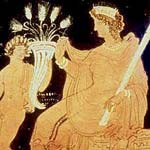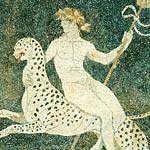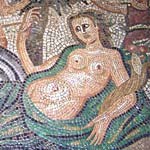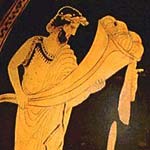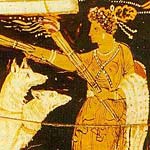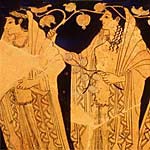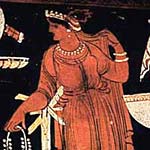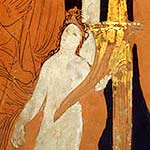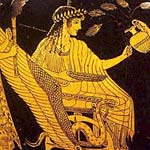|
|
| |||||||||||||||
|
|
| |||||||||||||||
|
|
| |||||||||||||||
A COMPLETE LIST OF GREEK AGRICULTURAL GODS & GODDESSES
There were a large number of gods and demi-gods associated with the various Mystery-cults. However, descriptions of these are sparse due to the strict rules of secrecy surrounding these ancient religions.BAUBO or IAMBE An Eleusinian demi-goddess who presided over ribald humour practised as part of the cult rites. She was an Eleusinian woman who made the grief-stricken Demeter laugh with her course jokes and exposed genitalia.
BOOTES The agricultural demi-god inventor of the wagon and the plough. He was a son of the goddess Demeter. Both he and his wagon were placed amongst the stars as the constellations Bootes and Ursa as a memorial of his benefaction to mankind.
CABIRI (Kabeiroi) A pair of metalworking gods associated with the Mysteries of Samothrace and Lemnos. They were the keepers of the sacred phallus of the dead god Zagreus.
CABIRIDES (Kabeirides) Nymphs of the Samothracian Mysteries, the female counterparts of the Cabiri.
CADMILUS (Kadmilos) The father of the Cabiri gods of the Samothrakian Mysteries.
CALLIGENEIA (Kalligeneia) The nurse of the Eleusinian Demeter or her daughter Persephone. She was one of the minor goddesses of the Mysteries.
CARME (Karme) A Cretan goddess-nymph who probably presided over the harvest festival, her name meaning "to crop" or "shear." Her father Carmanor was the consort of Demeter in the local cult, and Carme was probably the goddess' daughter.
CARMANOR (Karmanor) A Cretan harvest god whose name is derived from the word "to crop" or "shear." He was a consort of the goddess Demeter.
CARPI (Karpoi) The gods of the fruits (including grain) of the earth. They were depicted as plump infants in the company of Demeter and Gaea.
CHRYSOTHEMIS (Khrysothemis) A Cretan goddess, daughter of Carmanor "the shearer," whose own name means "golden custom." She was also known as Acacallis after the Cretan word for narcissus. She may have been a goddess of the cult hymns (like the Eleusinian Eumolpus) for a myth recounts that she won the first musical contest at Delphi.
CORE (Koura) "The maiden", a cult name of the goddess Persephone.
CYAMITES (Kyamites) The demi-god of the bean. He was one of the heroes of the Eleusinian Mysteries. The bean was for some reason a taboo foodstuff for initiates in the cult.
DAEIRA A goddess nymph of the Eleusinian mysteries, connected with Persephone and the Underworld. She may have presided over the secret knowledge of the Mysteries since her name means "the knowing one."
DEMETER The great Olympian goddess of agriculture, its chief crops, maize and barley, and its products, flour and bread. She was the chief goddess of the Eleusinian Mysteries whose initiates were promised the path to a blessed afterlife.
DESPOENE (Despoine) A daughter of the goddess Demeter who was worshipped in the mystery cult of Acacesium in Arcadia. She was similar to Persephone, but marginally regarded as a distinct goddess.
DIONYSUS (Dionysos) The god of viticulture and wine, and chief god of a number of Mystery cults. In the Eleusinian mysteries Dionysus was a spring-time god closely associated with Persephone.
DIOSCURI (Dioskouroi) A pair of Spartan demi-gods. When Zeus granted Polydeuces immortality, he insisted on sharing the gift with his twin brother Castor. As a result the pair divided their time between heaven and the underworld. The pair were closely associated with the Mysteries of Demeter and Dionysus.
DYSAULES A demi-god of the Eleusinian Mysteries who was associated with the Field of Rharus where the first grain was sowed.
ELEUSIS One of the Oceanid nymphs. She was the eponymous goddess of the city of Eleusis and a patron of its Mysteries.
EUBOULEUS An Eleusinian demi-god connected with ploughing and the sowing of seed.
EUMOLPUS An Eleusinian demi-god. He was the ancestor of the Eumolpides, the priests of the Eleusinian Mysteries. His name means "fine-song," which would seem to suggest he was the reputed author of the mystery's hymns.
EUNOSTUS (Eunostos) The goddess protector of the flour mill and the grain silo. Her name means "she of the good yield." The name might simply be a cult epithet of the goddess Demeter.
GAEA (Gaia) The primeval goddess of the earth. She was a passive goddess in the Mysteries, being superceded by the great Olympian goddess De-meter (Mother Earth), which whom she was closely identified.
HADES (Haides) The King of the Underworld and god of the wealth of the earth, both its minerals and fertility. He was closely associated with the Eleusinian Mysteries as the god who abducted the grain-maiden Persephone to the underworld, and agreed to her return. He was often depicted pouring fertility from a cornucopia, or horn of plenty, signifying his role in the Mysteries as the god of earth's fecundity.
HECATE (Hekate) The goddess of magic and leader of the ghosts. She was the minister of the goddess Persephone, and third of the great goddesses of the Eleusinian Mysteries. She was particularly associated with nocturnal rites and was depicted holding a pair of torches.
HERMES CHTHONIUS (Khthonios) The guide of the dead. The Chthonic Hermes led Persephone back from the underworld in spring. He was represented as a phallic god aroused by the sight of the goddess.
HESTIA The maiden goddess of the hearth who presided over the baking of bread, mankind's stable food. She was closely associated with the grain-goddess Demeter, and the pair were often depicted seated side by side amongst the gods of Olympus.
HORAE The goddesses of the seasons who ordered the heavenly cycles. They were spring-time companions of Persephone and Demeter. Individually they represented peace, justice and good order, prerequisites for farming prosperity.
IACCHUS (Iakkhos) The god of the ritual cry "iacche iacche" of the Eleusinian processions. Holding a torch in his hand, he was represented leading Persephone forth from the underworld. The god was identified with the Chthonic Hermes and Bacchic Dionysus.
IASION The consort of Demeter in teh Samothracian Mysteries. He lay with the goddess in a thrice-ploughed field and for this was struck down by a thunderbolt of Zeus. Like Persephone, he was probably represented returning to Demeter from the underworld in the spring.
LAMPADES Torch-bearing nymphs of the underworld. They were attendants of the Eleusinian Hecate, and were probably imagined as guiding the ghosts of the Initiates to their blessed resting place in Hades.
MACARIA (Makaria) The goddess of the "blessed" death. She was a daughter of Hades and Persephone who was probably connected with the favoured afterlife promised to the initiates of the Mysteries.
OCEANIDES Goddess nymphs who presided over the earthly sources of fresh-water. They were the spring-time companions of the goddess Persephone.
PERSEPHONE The queen of the underworld and goddess of the grain. Her return to the earth marked the onset of spring and the sprouting of the new grain. In the Mystery cult she presided over secret rites which ensured initiates the path to a blessed afterlife.
PLUTUS (Ploutos) The blind god of agricultural wealth and bountiful harvests. He was a son of Demeter who was depicted as a boy holding a cornucopia (horn of plenty) sprouting with grain or the fruits of the earth.
POSEIDON The god of both the sea and the sources of fresh-water (rivers, springs and wells). By Demeter he was the father of the Mystery goddess Despoene.
TRIPTOLEMUS (Triptolemos) The greatest of the Eleusinian demi-gods or heroes. He was despatched by Demeter and Persephone in a winged, serpent-drawn chariot to instruct the whole of mankind in the art of agriculture. His name means "he who pounds the husks", and he was probably associated in the Mysteries with the sacred threshing floor.
TROCHILUS (Trokhilos) A demi-god of the Eleusinian Mysteries. His name means "he who turns," which suggests he was associated with the wheel used for the grinding of flour.
ZAGREUS The mystic Dionysus. He was a son of Zeus and Persephone who was torn apart by the Titans when his father placed him on the throne of heaven. Only his heart was recovered which the god fed to Semele who rebirthed the child as the god Dionysus.
ZEUS The king of the gods and god of rain. He was one of the major gods of agricuture alongside Demeter (Earth), Persephone (Grain), and Hades (Earth's Chthonic Fertility).
ARISTOPHANES' DESCRIPTION OF THE ELEUSINIAN PROCESSION
"[Comedy-Play describing the song of the Thesmophoria festival of Demeter.][Man] : Look, Thratta, at the cloud of smoke that arises from all these lighted torches. Ah! beautiful [festival of the] Thesmophorai! grant me your favours, protect me, both within the temple and on my way back! Come, Thratta, put down the basket and take out the cake, which I wish to offer to the two goddesses. Mighty divinity, oh, Demeter, and thou, Persephone, grant that I may be able to offer you many sacrifices; above all things, grant that I may not be recognized.
Woman Herald : Silence! Silence! Pray to the Thesmophorai, Demeter and Koura [Persephone]; pray to Ploutos, Kalligeneia, Kourotrophos [Hekate], Ge (the Earth), Hermes and the Kharites (Graces), that all may happen for the best at this gathering, both for the greatest advantage of Athens and for our own personal happiness! May the award be given her who, by both deeds and words, has most deserved it from the Athenian people and from the women! Address these prayers to heaven and demand happiness for yourselves. Io Paean! Io Paean! Let us rejoice!
Chorus (singing) : May the gods deign to accept our vows and our prayers! Oh! almighty Zeus, and thou, god with the golden lyre [Apollon], who reignest on sacred Delos, and thou, oh, invincible virgin, Pallas [Athene], with the eyes of azure and the spear of gold, who protectest our illustrious city, and thou [Artemis], the daughter of the beautiful Leto, queen of the forests, who art adored under many names, hasten hither at my call. Come, thou mighty Poseidon, king of the sea, leave thy stormy whirlpools of Nereos; come, Korai Enialioi (Sea-Maidens), come, ye Nymphai Oreiplanktoi (Mountain-Wandering Nymphs). Let us unite our voices to the sounds of the golden lyre, and may wisdom preside at the gathering of the noble matrons of Athens.
Woman Herald : Address your prayers to the gods and goddesses of Olympos, of Delphoi, Delos and all other places." - Aristophanes, Thesmophoriazusae 280
